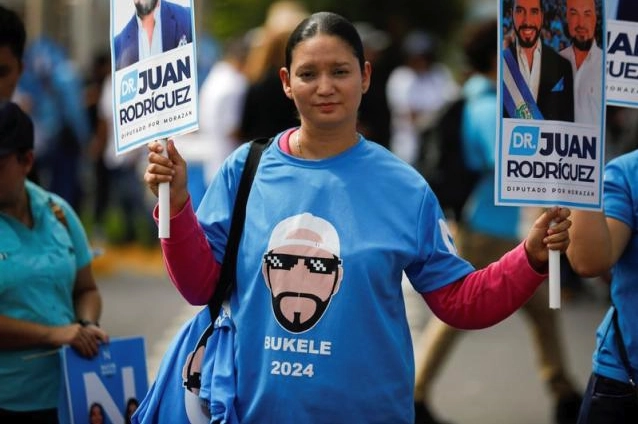Inexorably, Salvadoran President Nayib Bukele is calmly heading towards his unconstitutional reelection. We say inexorably because he controls the entire state apparatus, including the legislative and judicial branches. Moreover, through a well-executed social media campaign, he continues to convince a significant portion of the population that he is a great president.
The pre-election atmosphere is colored by complaints from the opposition, to which very few pay special attention. “Bukele and his people are truly wizards using social media, and the president’s charisma does the rest… he does it in such a way that his audiences only think that they can now walk more peacefully through the streets,” says an analyst who prefers to remain anonymous. Despite a drop in his positive image, according to the latest polls, Bukele still enjoys a 71% approval rating. Perhaps the figure is exaggerated, but there is no doubt that he has the endorsement of the majority.
The Illegality of Bukele’s Candidacy
Last Independence Day, on September 15, Bukele stated in a speech that he would seek reelection to “emulate the good aspects of developed nations,” despite acknowledging that reelection is not constitutionally allowed in the country.
The Constitution of El Salvador explicitly prohibits presidential reelection in four articles. Article 75 states that “those who subscribe to minutes, proclaims, or endorsements to promote or support the reelection or continuation of the president of the Republic or use direct means aimed at that end lose their rights as citizens.”
Article 88 considers alternation “indispensable for the maintenance of the established form of government and political system.” “Violation of this norm obliges to insurrection,” it adds. In turn, Article 152 states that the person who has held the presidency for more than six consecutive or non-consecutive months in the immediate previous period or within the last six months before the start of the presidential term cannot be a candidate.
These are just a few of the articles that explicitly affirm the illegality of his candidacy. However, none of this matters with a Supreme Court servile to the president and an Electoral Supreme Tribunal that fulfills its responsibilities by adhering to the court’s rulings.
After Bukele’s announcement, which was expected throughout the country, the opposition jumped from its scarce seats in the legislature to question the president’s intentions. The right-wing Nationalist Republican Alliance (ARENA) declared that “Bukele finally took off the mask and revealed his true intention, to perpetuate himself in power.” Meanwhile, the supposedly leftist Farabundo Martí National Liberation Front (FMLN) stated in a press release that Bukele’s intentions “go against the Constitution of the Republic,” lamenting the endorsement given to this illegal aspiration by the Constitutional Chamber of the Supreme Court.
The Reality of Ordinary Salvadorans
In recent years, corruption has reached unprecedented levels. But Bukele, who navigates the world of social media very well, has managed to monopolize the narrative of his achievements—both real and supposed—especially in the field of citizen security, as the streets of cities are quieter. This comes at the cost of the constant violation of the human rights of marginalized, though not marginal, sectors of the population.
According to human rights organizations, thousands of people have been in prison for months and years without being judged. The common factors among the victims are that they are poor, almost illiterate and from rural backgrounds. Estimates from these organizations show that these individuals make up almost 40% of the prison population, a difficult-to-verify figure. The government’s goal is to showcase imprisoned “criminals” to the audience. In other words, maximize the impact of its policy on a population that, at the very least, feels less besieged by crime.
In this scenario, Bukele obviously continues to lead the executive branch and will be reelected, as approval levels, which once dropped significantly, have risen considerably again. Buttressing that are his intelligent campaigns on social media, his charisma, his believable though false statements, the emerging security being felt on the streets, but, above all, a discredited and scattered opposition.
For now, Bukele holds all the strings of power and no one seems capable of taking them away, especially considering that he has virtually unrestricted support from the armed forces and security. The opposition, which is relegated within the structures of the state—especially in Parliament—there are no strategies to confront the ruling party. Although it is in some rural areas where the president has less support, the votes would not be sufficient to counteract the support he has in major urban centers, even if they were mostly for an opposition candidate.
On the other hand, despite supposed “clashes” with Washington, the opposition is aware that from the north it is preferred to confront a figure like Bukele and his narrative than a frontal opposition to U.S. interests in the region.
*Translated by Ricardo Aceves from the original in Spanish.













